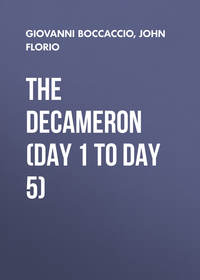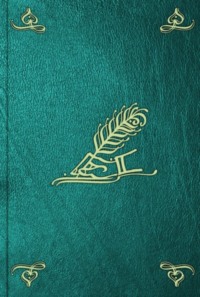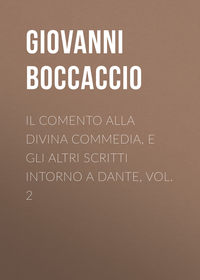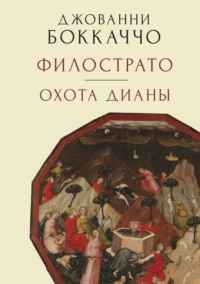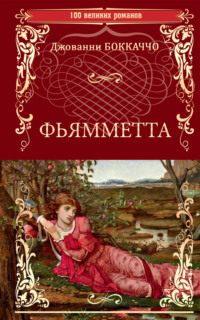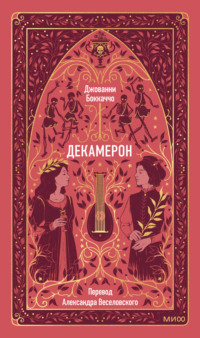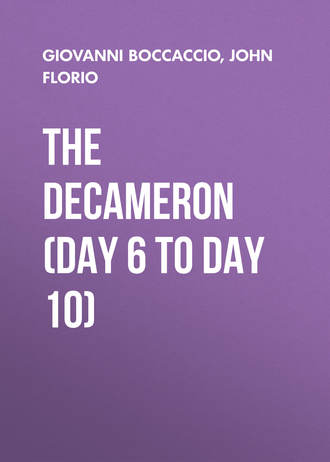 полная версия
полная версияThe Decameron (Day 6 to Day 10)
Noble Ladies, the precedent Novell delivered by Madame Lauretta, maketh me willing to speake of another jealous man; as being halfe perswaded, that whatsoever is done to them by their Wives, and especially upon no occasion given, they doe no more then well becommeth them. And if those grave heads, which were the first instituters of lawes, had diligently observed all things; I am of the minde, that they would have ordained no other penalty for Women, then they appointed against such, as (in their owne defence) do offend any other. For jealous husbands, are meere insidiators of their Wives lives, and most diligent pursuers of their deaths, being lockt up in their houses all the Weeke long, imployed in nothing but domesticke drudging affayres: which makes them desirous of high Festivall dayes, to receive some little comfort abroad, by an honest recreation or pastime, as Husbandmen in the fields, Artizans in our Citie, or Governours in our judiciall Courtes; yea, or as our Lord himselfe, who rested the seaventh day from all his travailes. In like manner, it is so willed and ordained by the Lawes, as well divine as humane, which have regard to the glory of God, and for the common good of every one; making distinction betweene those dayes appointed for labour, and the other determined for rest. Whereto jealous persons (in no case) will give consent, but all those dayes (which for other women are pleasing and delightfull) unto such, over whom they command, are most irksome, sadde and sorrowful, because then they are lockt up, and very strictly restrained. And if question were urged, how many good women do live and consume away in this torturing hell of affliction: I can make no other answere, but such as feele it, are best able to discover it. Wherefore to conclude the proheme to my present purpose, let none be over rash in condemning women: for what they do to their husbands, being jealous without occasion; but rather commend their wit and providence.
Somtime (faire Ladies) there lived in Arimino, a Merchant, very rich in wealth and worldly possessions, who having a beautifull Gentlewoman to his wife, he became extreamly jelous of her. And he had no other reason for this foolish conceit; but, like as he loved hir dearly, and found her to be very absolutely faire: even so he imagined, that although she devised by her best meanes to give him content; yet others would grow enamored of her, because she appeared so amiable to al. In which respect, time might tutor her to affect some other beside himselfe: the onely common argument of every bad minded man, being weake and shallow in his owne understanding. This jelous humor increasing in him more and more, he kept her in such narrow restraint: that many persons condemned to death, have enjoyed larger libertie in their imprisonment. For, she might not bee present at Feasts, Weddings, nor goe to Church, or so much as to be seen at her doore: Nay, she durst not stand in her Window, nor looke out of her house, for any occasion whatsoever. By means whereof, life seemed most tedious and offensive to her, and she supported it the more impatiently, because shee knew her selfe not any way faulty.
Seeing her husband still persist in this shamefull course towards her; she studied, how she might best comfort her selfe in this desolate case: by devising some one meane or other (if any at all were to bee founde) whereby he might be requited in his kind, and wear that badge of shame whereof he was now but onely affraid. And because she could not gain so small a permission, as to be seene at any window, where (happily) she might have observed some one passing by in the street, discerning a little parcell of her love: she remembred at length, that, in the next house to her Husbands (they both joyning close together) there dwelt a comely young proper Gentleman, whose perfections carried correspondencie with her desires. She also considered with her selfe, that if there were any partition wall; such a chinke or cranny might easily be made therein, by which (at one time or other) she should gaine a sight of the young Gentleman, and finde an houre so fitting, as to conferre with him, and bestow her lovely favour on him, if he pleased to accept it. If successe (in this case) proved answerable to her hope, then thus she resolved to outrun the rest of her wearisome dayes, except the frensie of jealousie did finish her husbands loathed life before.
Walking from one roome to another, thorough every part of the house; and no wall escaping without diligent surveying; on a day, when her Husband was absent from home, she espyed in a corner very secret, an indifferent cleft in the Wall, which though it yeelded no full view on the other side, yet she plainly perceived it to be an handsome Chamber, and grew more then halfe perswaded, that either it might be the Chamber of Philippo (for so was the neighbouring young Gentleman named) or else a passage guiding thereto. A Chambermaid of hers, who compassioned her case very much; made such observance, by her Mistresses direction, that she found it to be Philippoes bed Chamber, and where alwayes he used to lodge alone. By often visiting this rift or chinke in the Wall, especially when the Gentleman was there; and by throwing in little stones, flowers, and such like things, which fell still in his way as he walked: so farre she prevailed, that he stepping to the chinke, to know from whence they came; shee called softly to him, who knowing her voyce, there they had such private conference together, as was not any way displeasing to either. So that the chinke being made a little larger; yet so, as it could not be easily discerned: their mouthes might meete with kisses together, and their hands folded each in other; but nothing else to be performed, for continuall feare of her jelous husband.
Now the Feast of Christmasse drawing neere, the Gentlewoman said to her Husband; that, if it stood with his liking: she would do such duty as fitted with so solemne a time, by going earely in a morning unto Church, there to be confessed, and receive her Saviour, as other Christians did. How now? replied the jealous Asse, what sinnes have you committed, that should neede confession? How Husband? quoth she, what do you thinke me to be a Saint? Who knoweth not, I pray you, that I am as subject to sinne, as any other Woman living in the world? But my sins are not to be revealed to you, because you are no Priest. These words enflamed his jealousie more violently then before, and needes must he know what sinnes she had committed, & having resolved what to do in this case, made her answer: That hee was contented with her motion, alwaies provided, that she went to no other Church, then unto their owne Chappel, betimes in a morning; and their own Chaplaine to confesse her, or some other Priest by him appointed, but not any other: and then she to returne home presently againe. She being a woman of acute apprehension, presently collected his whole intention: but seeming to take no knowledge thereof, replyed, that she would not swerve from his direction.
When the appointed day was come, she arose very earely, and being prepared answerable to her owne liking, to the Chappell shee went as her Husband had appointed, where her jealous Husband (being much earlier risen then she) attended for her comming: having so ordred the matter with his Chaplaine, that he was cloathed in his Cowle, with a large Hood hanging over his eyes, that she should not know him, and so he went and sate downe in the Confessors place. Shee being entred into the Chappell, and calling for the Priest to heare her confession, he made her answer: that he could not intend it, but would bring her to another holy Brother, who was at better leysure then hee. So to her Husband he brought her, that seemed (in all respects) like the Confessor himselfe: save onely his Hood was not so closely veyled, but shee knew his beard, and said to her selfe. What a mad world is this, when jealousie can metamorphose an ordinary man into a Priest? But, let me alone with him, I meane to fit him with that which he lookes for.
So, appearing to have no knowledge at all of him, downe she fell at his feete, and he had conveyed a few Cherry stones into his mouth, to trouble his speech from her knowledge; for, in all things els, he thought himselfe to be sufficiently fitted for her. In the course of her confession, she declared, that she was married to a most wicked jealous Husband, and with whom she lead a very hatefull life. Neverthelesse (quoth she) I am indifferently even with him, for I am beloved of an Holie Fryar, that every night commeth and lyeth with me. When the jealous Husband heard this, it stabbed him like a dagger to the heart, and, but for this greedy covetous desire to know more; he would faine have broke off confession, and got him gone. But, perceiving that it was his wisest course, he questioned further with his wife, saying: Why good Woman, doth not your husband lodge with you? Yes Sir, quoth she. How is it possible then (replyed the Husband) that the Friar can lodge there with you too?
She, dissembling a farre fetcht sigh, thus answered. Reverend Sir, I know not what skilfull Art the Fryar useth, but this I am sure, every doore in our house will flye open to him, so soone as he doth but touch it. Moreover, he told me, that when he commeth unto my Chamber doore, he speaketh certaine words to himselfe, which immediately casteth my Husband into a dead sleepe, and, understanding him to bee thus sleepily entranced: he openeth the doore, entreth in, lieth downe by me, and this every night he faileth not to do. The jealous Coxcomb angerly scratching his head, and wishing his wife halfe hangd, said: Mistresse, this is very badly done, for you should keepe your selfe from all men, but your husband onely. That shall I never doe, answered shee, because (indeed) I love him dearely. Why then (quoth our supposed Confessor) I cannot give you any absolution. I am the more sory Sir, said she, I came not hither to tell you any leasings, for if I could, yet I would not, because it is not good to fable with such Saint-like men as you are. You do therein (quoth hee) the better, and surely I am very sory for you, because in this dangerous condition, it will bee the utter losse of your soule: neverthelesse, both for your husbands sake and your owne, I will take some paines, and use such especiall prayers in your name, which may (perchance) greatly avayle you. And I purpose now and then, to send you a Novice or young Clearke of mine, whom you may safely acquaint with your minde, and signifie to me, by him, whether they have done you good, or no: and if they prove helpefull, then will we further proceed therein. Alas Sir, said she, never trouble your selfe, in sending any body to our house; because, if my Husband should know it, he is so extreamly jelous, as all the world cannot otherwise perswade him, but that he commeth thither for no honest intent, and so I shall live worse then now I do. Fear not that, good woman, quoth he, but beleeve it certainly, that I will have such a care in this case, as your Husband shall never speake thereof to you. If you can doe so Sir, sayde she, proceed I pray you, and I am well contented.
Confession being thus ended, and she receiving such pennance as hee appointed, she arose on her feete, and went to heare Masse; while our jealous Woodcocke (testily puffing and blowing) put off his Religious habite, returning home presently to his house, beating his braines al the the way as he went, what meanes he might best devise, for the taking of his wife and the Friar together, whereby to have them both severely punished. His wife being come home from the Chappell, discerned by her Husbands lookes, that he was like to keepe but a sory Christmasse: yet he used his utmost industry, to conceale what he had done, & which she knew as well as himself. And he having fully resolved, to watch his own street doore the next night ensuing in person, in expectation of the Friars comming, saide to his Wife. I have occasion both to suppe and lodge out of my house this night, wherefore see you the streete doore to be surely made fast on the inside, and the doore at the middest of the staires, as also your own Chamber doore, and then (in Gods name) get you to bed. Whereto she answered, that all should be done as hee had appointed.
Afterward, when she saw convenient time, she went to the chink in the Wall, and making such a signe as shee was woont to doe: Phillippo came thither, to whom she declared all her mornings affayres, & what directions her husband had given her. Furthermore she saide, certaine I am, that he will not depart from the house, but sit and watch the doore without, to take one that comes not heere. If therefore, you can climbe over the house top, and get in at our gutter Window, you and I may conferre more familiarly together. The young Gentleman being no dullard, had his lesson quickly taught him; and when night was come, Geloso (for so must wee tearme the Cocke-braind husband) armes himselfe at all points, with a browne Bill in his hand, and so he sits to watch his owne doore. His Wife had made fast all the doores, especially that on the midst of the stayres, because he should not (by any means) come to her Chamber; and so, when the houre served, the Gentleman adventured over the house top, found the gutter Window, and the way conducting him to her Chamber, where I leave them to their further amorous conference.
Geloso, more then halfe mad with anger, first, because hee had lost his supper: next, having sitten almost all the night (which was extreamely cold and windie) his Armour much molesting him, and yet he could see no Friar come: when day drew neere, and hee ashamed to watch there any longer; conveighed himselfe to some more convenient place, where putting off his Armes, and seeming to come from the place of his Lodging; about the ninth houre, he found his doore open, entred in, & went up the stayres, going to dinner with his Wife. Within a while after, according as Geloso had ordred the businesse, a youth came thither, seeming to be the Novice sent from the Confessor, and he being admitted to speake with her, demanded, whether shee were troubled or molested that night passed, as formerly she had bin, and whether the partie came or no? The Woman, who knew well enough the Messenger (notwithstanding all his formall disguise) made answer: That the party expected, came not: but if hee had come, it was to no purpose; because her minde was now otherwise altred, albeit she changed not a jote from her amorous conclusion.
What should I now further say unto you? Geloso continued his watch many nights afterward, as hoping to surprize the Friar at his entrance, and his wife kept still her contented quarter, according as opportunitie served. In the conclusion, Geloso being no longer able to endure his bootlesse watching, nor some (more then ordinary) pleasing countenance in his wife: one day demaunded of her (with a very stearne and frowning brow) what secret sinnes shee had revealed to the ghostly Father, upon the day of her shrift? The Woman replyed, that she would not tell him, neyther was it a matter reasonable, or lawfull for her to doe. Wicked Woman, answered Geloso: I knowe them all well enough, even in despight of thee, and every word that thou spakest unto him. But Huswife, now I must further know, what the Fryar is, with whom you are so farre in love, and (by meanes of his enchantments) lyeth with you every night; tell me what and who he is, or else I meane to cut your throate.
The Woman immediately made answer, it was not true, that she was in love with any Fryar. How? quoth Geloso, didst thou not thou confesse so much to the Ghostly Father, the other day when thou wast at shrift? No Sir, sayde she, but if I did, I am sure he would not disclose it to you, except hee suffered you to bee there present, which is an Article beyonde his dutie. But if it were so, then I confesse freely, that I did say so unto him. Make an end then quickely Wife (quoth Geloso) and tell mee who the Friar is. The Woman fell into a hearty laughter, saying. It liketh me singularly well, when a wise man will suffer himselfe to be ledde by a simple Woman, even as a Sheepe is to the slaughter, and by the hornes. If once thou wast wise, that wisedome became utterly lost, when thou felst into that divellish frensie of jealousie, without knowing anie reason for it: for, by this beastlike and no manly humor, thou hast eclipsed no meane part of my glory, and womanly reputation.
Doest thou imagine Husband, that if I were so blinded in the eyes of my head, as thou art in them which should informe thine understanding; I could have found out the Priest, that would needs bee my Confessor? I knew thee Husband to be the man, and therefore I prepared my wit accordingly, to fit thee with the foolish imagination which thou soughtest for, and (indeed) gave it thee. For, if thou hadst beene wise, as thou makest the world to beleeve by outward apparance, thou wouldest never have expressed such a basenesse of minde, to borrow the coulour of a sanctified cloake, thereby to undermine the secrets of thine honest meaning Wife. Wherefore, to feede thee in thy fond suspition, I was the more free in my Confession, and tolde thee truely, with whom, and how heinously I had transgressed. Did I not tell thee, that I loved a Fryar? And art not thou he whom I love, being a Fryar, and my ghostly Father, though (to thine owne shame) thou madst thy selfe so? I said moreover, that there is not any doore in our house, that can keepe it selfe shut against him, but (when he pleaseth) he comes and lies with me. Now tell me Husband, What doore in our house hath (at any time) bin shut against thee, but they are freely thine owne, & grant thee entrance? Thou art the same Friar that confest me, and lieth every night with me, and so often as thou sentst thy young Novice or Clearke to me, as often did I truly returne thee word, when the same Fryar lay with me. But (by jealousie) thou hast so lost thine understanding, that thou wilt hardly beleeve all this.
Alas good man, like an armed Watchman, thou satst at thine owne doore all a cold Winters night, perswading mee (poore silly credulous woman) that, upon urgent occasions, thou must needs suppe and lodge from home. Remember thy selfe therefore better heereafter, become a true understanding man, as thou shouldst bee, and make not thy selfe a mocking stocke to them, who knoweth thy jealous qualities, as well as I do, and be not so watchfull over me, as thou art. For I sweare by my true honesty, that if I were but as willing, as thou art suspitious: I could deceive thee, if thou hadst an hundred eyes, as Nature affords thee but two, and have my pleasures freely, yet thou be not a jot the wiser, or my credit any way impaired.
Our wonderfull wise Geloso, who (very advisedly considred) that he had wholly heard his wives secret confession, and dreamed now on no other doubt beside, but (perceiving by her speeches) how hee was become a scorne to al men: without returning other answer, confirmed his wife to bee both wise and honest, and now when he hadde just occasion to be jealous indeede, hee utterly forsware it, and counted them all Coxcombes that would be so misguided. Wherefore, she having thus wisely wonne the way to her owne desires, and he reduced into a more humane temper: I hope there was no more neede, of clambring over houses in the night time like Cats, nor walking in at gutter Windowes, but all abuses were honestly reformed.
Madame Isabella, delighting in the company of her affected Friend, named Lionello, and she being likewise beloved by Signior Lambertuccio: At the same time as shee had entertained Lionello, shee was also visited by Lambertuccio. Her Husband returning home in the very instant: shee caused Lambertuccio to run forth with a drawne sword in his hand, and (by that meanes) made an excuse sufficient for Lionello to her husbandThe Sixth Novell
Wherein is manifestly discerned, that if Love be driven to a narrow straite in any of his attempts, yet hee can accomplish his purpose by some other supplyWondrously pleasing to all the company, was the reported Novell of Madame Fiammetta, every one applauding the Womans wisedome, and that she had done no more, then as the jealous foole her husband justly deserved. But shee having ended, the King gave order unto Madame Pampinea, that now it was her turne to speake, whereupon, thus she began. There are no meane store of people who say (though very false and foolishly,) that Love maketh many to be out of their wits, and that such as fall in Love, do utterly loose their understanding. To mee this appeareth a very ydle opinion, as already hath beene approved by the related discourses, and shall also bee made manifest by another of mine owne.
In our City of Florence, famous for some good, though as many bad qualities, there dwelt (not long since) a Gentlewoman, endued with choice beauty and admirable perfections, being wife to Signior Beltramo, a very valiant Knight, and a man of great possessions. As oftentimes it commeth to passe, that a man cannot alwayes feede on one kind of bread, but his appetite will be longing after change: so fared it with this Lady, named Isabella, she being not satisfied with the delights of her Husband; grew enamoured of a young Gentleman, called Lionello, compleate of person and commendable qualities, albeit not of the fairest fortunes, yet his affection every way sutable to hers. And full well you know (faire Ladies) that where the mindes irreciprocally accorded, no dilligence wanteth for the desires execution: so this amorous couple, made many solemne protestations, untill they should bee friended by opportunity.
It fortuned in the time of their hopefull expectation a Knight, named Signior Lambertuccio, fell likewise in love with Isabella: but because he was somewhat unsightly of person, and utterly unpleasing in the eye, she grew regardlesse of his frequent solicitings, and would not accept either tokens, or letters. Which when hee saw, (being very rich and of great power) hee sought to compasse his intent by a contrary course, threatning her with scandall and disgrace to her reputation, and with his associates to bandie against her best friends. She knowing what manner of man he was, and how able to abuse any with infamous imputations, wisely returned him hopefull promises, though never meaning to performe any, but onely (Lady-like) to flatter and foole him therewith.
Some few miles distant from Florence, Beltramo had a Castle of pleasure, and there his Lady Isabella used to live all Summer, as all other doe the like, being so possessed. On a day, Beltramo being ridden from home, and she having sent for Lionello, to take the advantage of her Husbands absence; accordingly he went, not doubting but to winne what he had long expected. Signior Lambertuccio on the other side, meeting Beltramo riding from his Castle, and Isabella now fit to enjoy his company: gallops thither with all possible speede, because hee would bee no longer delayed. Scarcely was Lionello entred the Castle, and receiving directions by the waiting woman, to her Ladies Chamber: but Lambertuccio gallopped in at the Gate, which the woman perceiving, ranne presently and acquainted her Lady with the comming of Lambertuccio.
Now was shee the onely sorrowfull woman of the world; for nothing was now to bee feared, but stormes and tempests, because Lambertuccio, spake no other, then Lightning and Thunder, and Lionello, (being no lesse affraide then shee) by her perswasion crept behind the bed, where he hid himselfe very contentedly. By this time Lambertuccio was dismounted from his Courser, which he fastened (by the bridle) to a ring in the wall, and then the waiting woman came to him, to guide him to her Lady and Mistresse: who stood ready at the staires head, graced him with a very acceptable welcome, yet marvelling much at his so sodaine comming. Lady (quoth he) I met your Husband upon the way, which granting mine accesse to see you; I come to claime your long delayed promise, the time being now so favourable for it.
Before he had uttered halfe these words, Beltramo, having forgot an especiall evidence in his Study, which was the onely occasion of his journey, came gallopping backe againe into the Castell Court, and seeing such a goodly Gelding stand fastened there, could not readily imagine who was the owner thereof. The waiting woman, upon the sight of her Masters entring into the Court, came to her Lady, saying: My Master Beltramo is returned backe, newly alighted, and (questionlesse) comming up the staires. Now was our Lady Isabella, ten times worse affrighted then before, (having two severall amourous suters in her house, both hoping, neither speeding, yet her credite lying at the stake for either) by this unexpected returne of her Husband. Moreover, there was no possible meanes, for the concealing of Signior Lambertuccio, because his Gelding stood in the open Court, and therefore made a shrewde presumption against her, upon the least doubtfull question urged.


